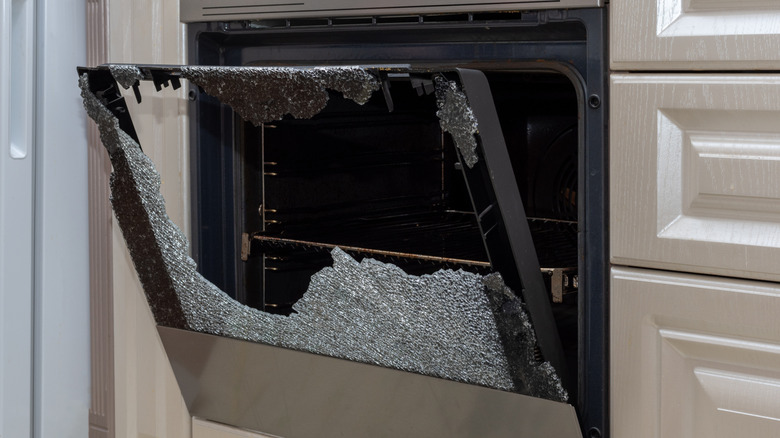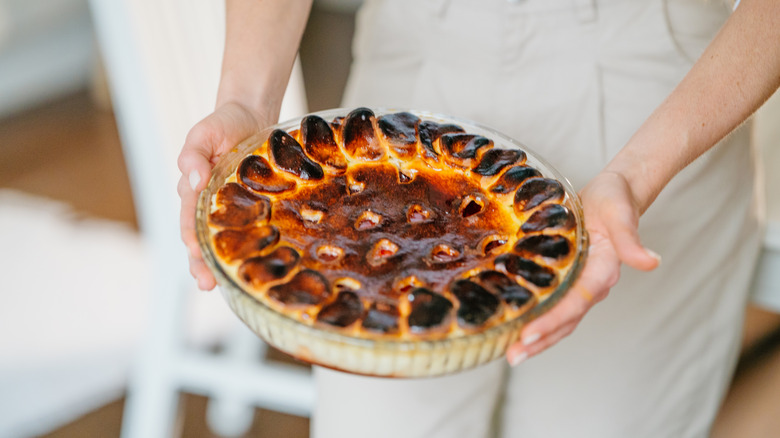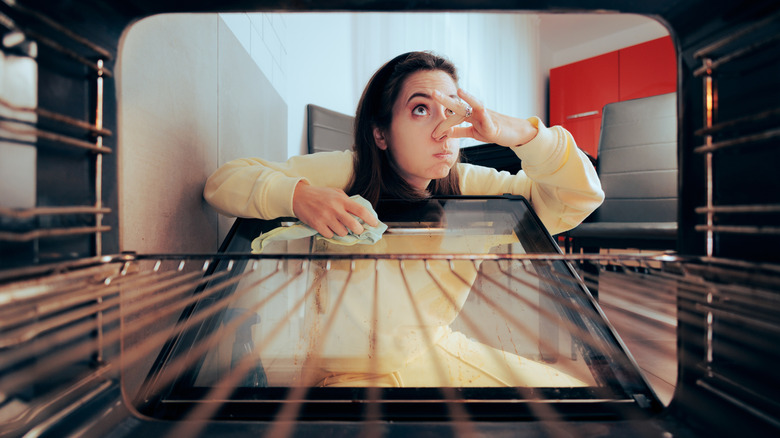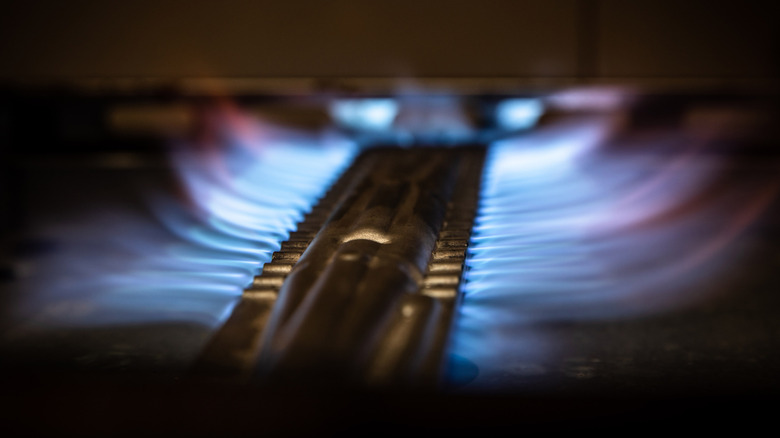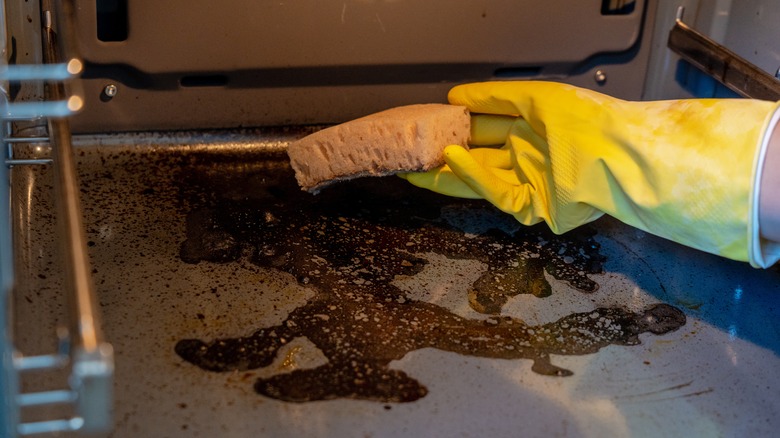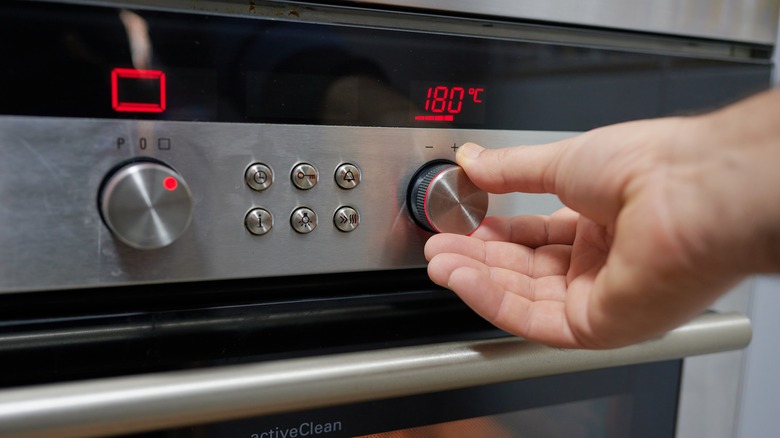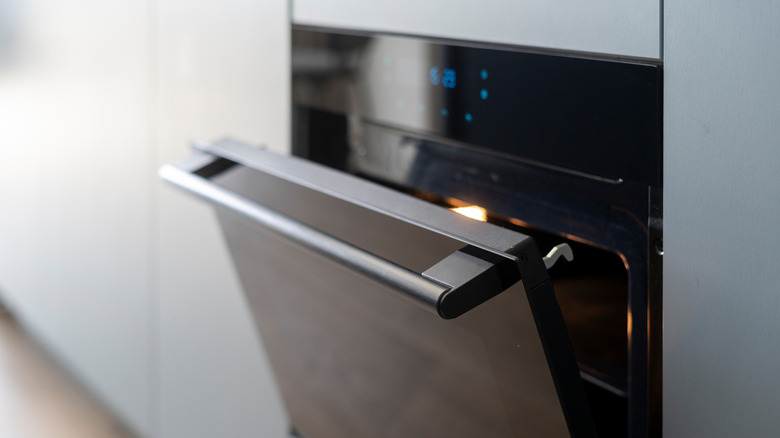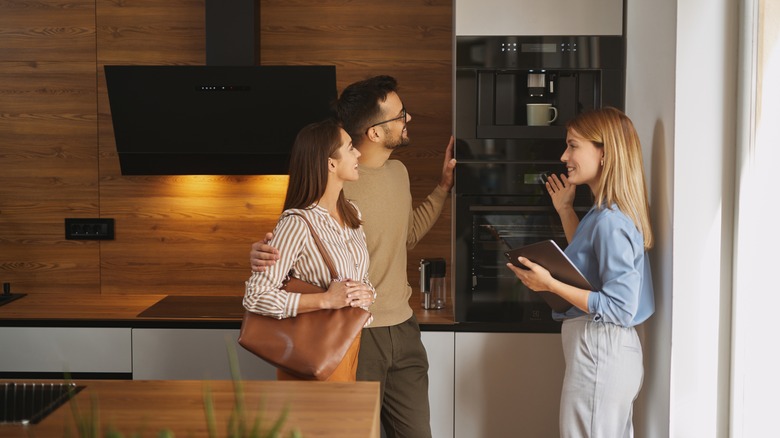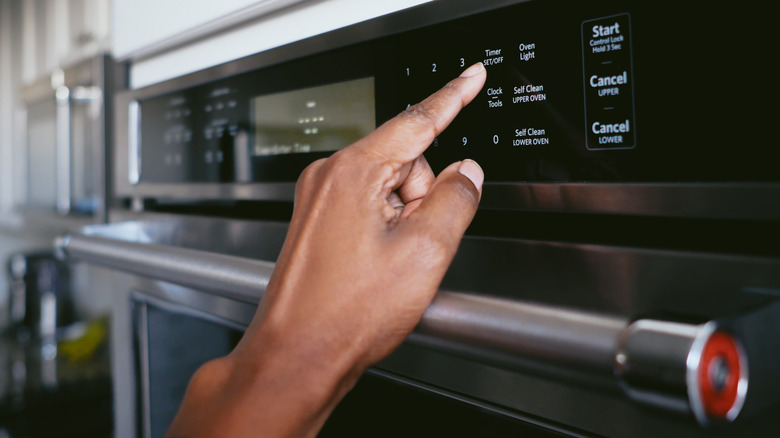11 Important Signs You Need To Replace Your Oven
As a former bakery owner, I've worn many hats — executive pastry chef, chocolatier, bookkeeper, inventory manager, dishwasher, and, of course, kitchen equipment mechanic. It seemed like on a daily basis, either a stand mixer, food processor, or oven needed repairs or had to be replaced. Through my experience fixing endless kitchen equipment-related issues, including that of the massive bakery oven variety to avoid the cost of hiring a handyman, I've recognized some important signs that indicate your oven might need to be replaced.
It's not uncommon to be in the difficult position of having to depart from your trusty appliances that you thought would last for decades. Whether you're remodeling your house and planning to make your dream kitchen or have simply overworked your oven to the breaking point, there's a plethora of issues that can arise and interfere with the functionality of your favorite kitchen appliance. Your oven is a powerhouse of the kitchen whether or not you're an avid home cook or baked goods fanatic, so you should always be geared with appliances that are both efficient and safe.
Your oven has visible wear and tear
Everyone desires a beautiful kitchen in their home. It's the beating heart of the house, where memories are made and delicious dishes are crafted. While vintage kitchen interiors and equipment are picturesque, the best way to create a thriving kitchen space is to have appliances designed for efficiency and style. This all begins with one of the busiest appliances: your oven.
If your oven has become an eyesore due to visual wear and tear, it will discourage you from becoming the best chef you can be. When owning any type of kitchen appliance it's always a good idea to be on the lookout for signs of corrosion. Some of the biggest threats to your oven are rust and discoloration due to the fluctuating levels of humidity and temperature. These issues may lead to uneven heating, decreased efficiency, and or potential components combusting. One way to prevent this is to frequently check for signs of corrosion both in the interior and exterior. However, suppose it has a shattered oven panel, broken door handles, a faulty timer, worn-out temperature gauges, or it's simply old, rusty, and dusty. In that case, it's time to replace it with a new model so you can cook efficiently and create all your culinary masterpieces.
Your oven cooks food unevenly
If you're feeling frustrated in the kitchen because the edges of your oven-baked macaroni and cheese always seem to get burnt, or your classic red velvet cake is always undercooked in the center, don't lose hope! The real issue might not be your cooking skills, but rather your oven. Your oven should always work its magic by cooking your food evenly and efficiently. If it's falling short in that department, it might be time to consider investing in a new one.
When your oven is unevenly cooking your tasty creations, there's a good chance the problem lies with the heating element or the temperature sensor. One of the most common issues for uneven cooking is a broken or damaged heating element. If you have an electric oven, it likely uses baking coils as its heating source. These coils generate heat when electricity flows through them, but after lots of delicious meals, they can wear out.
Another issue could be with the temperature sensor inside your oven. For those of you who don't know the sensor plays a crucial role by monitoring the temperature and sending signals to the control board to adjust or maintain the correct temperature. If this sensor isn't working properly, the control board won't receive the right signals, making it difficult to cook your food uniformly.
You smell odd odors when using your oven
Some of the best aromas lingering throughout your home are crafted in your kitchen. Whether it is the warm inviting smell of these Chewy Coconut Chocolate Chip Cookies baking until golden brown or the savory scents of this Herb-Roasted Beef Tenderloin sizzling away, if you're constantly cooking, your oven is basically a built perfumery for your house. If any odd odors are coming out from your oven, it might be an indication that something is wrong and it's time for a revamp of your appliance.
These odd odors can suggest various issues. Sometimes it's just because your oven is a bit dirty and has some burnt food stuck to the bottom, or it can indicate a faulty heating element. Electrical ovens with faulty heating elements slowly start to deteriorate over time, which can sometimes lead to funky odors wafting from your appliance.
If you've got a gas-powered oven and smell any sort of propane or gas odor, be sure to immediately turn off the oven and contact a gas utility supplier for inspection. A gas odor can indicate an internal leak inside the oven. Gas leaks are a serious safety concern and are crucial to identify in order to ensure the safety of your household.
There's excessive noise coming from your oven
Tons of kitchen appliances can create a ruckus like an extremely noisy blender or a high-powered stand mixer — although, your oven shouldn't be the one causing the storm. If you're an avid home cook it's pretty standard to hear some sounds coming from your oven, especially when you're roasting chicken that's sizzling until golden brown or if your pot of braised short ribs bubbling away. However, if it produces ear-piercing noises every time you turn it on, chances are it's time to replace your appliance.
Excessive noise can indicate a multitude of issues. One issue could be that you have a loose or broken oven panel that may create rattling noises as it heats up. If you have a convection oven, it's most likely the impeller fan, which helps circulate hot air inside the oven cavity. This fan can easily become warped or damaged over time, resulting in excessive noise. For gas ovens, it's common for the ignition gauge to become covered in grease or food particles, restricting the flow of gas and causing a popping sound as it attempts to re-ignite.
If you're ever hearing any noise from your oven that can't be explained by the food you're cooking, the safest thing to do is turn off your oven and contact a professional to examine it immediately. Whether it be the fan motor being faulty or the gas igniter producing an alarming popping noise, overwhelming noise is a clear indication that it's time to replace your oven.
Your gas oven isn't lighting properly
There are a few kitchen tools and appliances that every home cook is guilty of pushing to their lifespan limit. Whether it's a cutting board riddled with scratches or a microwave that's starting to make some strange sounds, one appliance you should never use until it breaks down is a gas-powered oven.
Gas ovens, unlike electric models, can be extremely hazardous when they wear out. If you are experiencing any ignition issues, long preheating times, or small, inconsistent flames, chances are you've got a serious issue on your hands. These problems can indicate a dirty ignition, a faulty circuit, or an issue with your gas supply. If the issue is caused by a dirty ignition, you can try cleaning it with a small brush or cloth, just be sure it's dry before testing the oven. Sometimes, the electrical circuit that powers the ignition may just trip, so you simply have to check if your home electrical panels are switched off. However, if ignition problems persist, it might be best to start searching for a new oven.
If you suspect there's an issue with your gas supply, or if you think it might even have a leak, you must turn off your oven immediately, open windows for ventilation, and call your gas supply company to alert them of the problem.
You notice energy efficiency issues
If you're wondering why your utility bills are skyrocketing, it might not be your radiator or your air-conditioner — it could be your oven. Ovens are notorious for being the kitchen appliance that consumes the most energy, and if you've got one that's not well-insulated, it might be causing you more harm than good.
Older ovens tend to have poor insulation, causing heat to escape through any crevice it can find. The loss of heat will cause your oven to work harder and consume more energy to ensure it stays at the right temperature. Furthermore, older ovens are known to be less efficient than the newer models. Typically, modern ovens have energy-saving features that will help you reduce your energy consumption and environmental footprint.
According to Constellation, people who own gas ovens enjoy lower energy costs compared to electric model owners. Additionally, convection ovens use around 20 percent less energy per month. These ovens use a fan and exhaust system to circulate hot air, allowing for faster and more efficient cooking. So if you're looking for an oven that's an energy saver and not a guzzler, go for the convection oven.
Your oven is uncleanable
All the nooks and crannies in an oven make it the perfect trap for grease stains and food spills that, over time, can become uncleanable, resulting in smoking or odors. If it's past the point of no return, it's time to ditch the sponge and head to the kitchen appliance store for a sparkling clean, brand-new oven.
Typically, you should be cleaning your oven every two to three months, although sometimes you may forget about it and those stains can add up. While you may be tempted to turn on the self-cleaning option, you might want to stop yourself since some people claim that it actually can break your oven and it's better to clean it manually. In an interview with the New York Times, Christina Mucci, co-owner of Fifth Avenue Appliance Service, said that the first question their technicians ask when the client's oven is broken is if they used the self-cleaning option. In the interview, Mucci states, "[T]he heat, smoke, or moisture from a self-cleaning cycle can break the oven."
Now, you shouldn't be just tossing your oven to the curb if it's a bit dirty. There are tons of oven cleaning hacks you can try before resorting to the trash can, including using a razor to scrape off burnt food or steaming cleaning it to get rid of any excess residue. However, if you've got an old, dated oven that has decades of stains and blemishes, it might be time to say goodbye.
Your oven has imprecise temperature control
It's common for ovens to fluctuate in temperature throughout the cooking process; however, a well-functioning oven should always recover from any temperature change. To achieve the best cooking results, you must maintain a consistent temperature in your oven. Any slight deviation could lead to devastating and damaging outcomes for your culinary creations. If your oven is overheating, failing to warm properly, or if a quick peek inside to check on your tray of blueberry muffins dramatically decreases the temperature, it often indicates that you need to replace your oven.
Inconsistent temperature control in ovens is frustrating, and it can signal a range of problems. Ideally, the issue is simply the calibration of your oven, as that can be resolved by adjusting the temperature settings or placing a thermometer inside to monitor the actual temperature. Depending on your make and model, it is either the heating element for electric ovens or ignition in gas ovens that could be affecting your temperature control.
A few signs that your electric oven heating element isn't functioning properly include uneven cooking of your food, visible damage on your baking coils, or the coils barely glowing red when turned on. For gas ovens, this problem is most likely due to a weakened ignition. Over time, the gas ignition can deteriorate, preventing it from opening its valve and releasing a flame. If either of these issues is present, a replacement will likely be necessary.
The oven door won't close properly
Dreaming of crafting a perfectly tiered layered cake or baking a delicious loaf of crusty sourdough bread? Well, those dreams can be swiftly swept away if your oven door isn't closing properly.
Your oven door not closing can lead to numerous issues like heat loss, energy efficiency issues, and of course, uneven cooking. The most common cause of oven doors not closing is because of damaged hinges and springs. These hinges and springs are often worn down from frequent use and the heaviness of the door, causing them to become loose or even break. Another cause could be the oven's gasket, also known as the oven's door seal, being deflated or filled with food debris, causing it to leak heat and reduce the efficiency of your kitchen's powerhouse appliance. Additionally, if these heat leaks aren't caught soon enough, they can cause burns and damage to the surrounding cabinetry.
There are loads of reasons why your oven door might not be closing right. Whether it be from loose nuts and bolts or the rubber lining being worn down after continuous batches of holiday cookies, if a technician can't fix the problem, you might want to consider replacing it.
It's older than the average lifespan
Everybody loves the warm, cozy feeling of a vintage kitchen. Every detail, from the cozy breakfast nooks and eccentric tile backsplashes to old cooking equipment that's been passed down for generations, can be charming. However, that old-fashioned design shouldn't dominate every aspect of your kitchen, especially when it comes to appliances like your oven.
Every appliance has a lifespan during which its performance gradually declines. The average lifespan of an oven varies depending on the type you own. An electric oven typically lasts for 10 to 13 years, whereas gas ovens have a slightly longer lifespan, usually around 15 years. If your oven is beyond this average, it's likely not worth investing more money into fixing it.
Of course, the lifespan is also influenced by how frequently you use the appliance. For instance, if you use your oven almost every day, you will need to replace it sooner than if you use it once every two weeks. You can maintain the longevity of your oven by promptly addressing any mechanical issues you might run into and prioritizing cleaning it regularly. But if you're reaching the end of its lifespan, you should probably take a trip to your local kitchen appliance store and purchase a replacement.
Your cooking needs have changed
If you're undergoing a kitchen renovation, you're probably reevaluating not only the design of the space but also your old appliances. Most newer ovens nowadays are equipped with features that can enhance your cooking efficiency, helping you become a better home cook. It's not uncommon to find ovens with Wi-Fi connectivity, allowing you to monitor and control the temperatures, set timers, and adjust the cooking setting. If you can find an oven with a built-in digital thermometer probe, it'll sear away the worries of your chicken breasts or salmon fillets being undercooked!
You can even find ovens that are equipped with an air-frying option so you get crispy, fried food without having to deep-fry in oil. Some ovens even include steaming cooking, so you can have a healthier cooking option. Plus, ovens with a streaming option are excellent if you are an avid baker who loves to make sponge cakes or cheesecakes since these sweet treats are best when baked in a high-humidity environment. So, if your current oven isn't helping you get dinner on the table fast enough on busy weeknights, it may be time to replace it with a newer model that's complete with all the bells and whistles.

